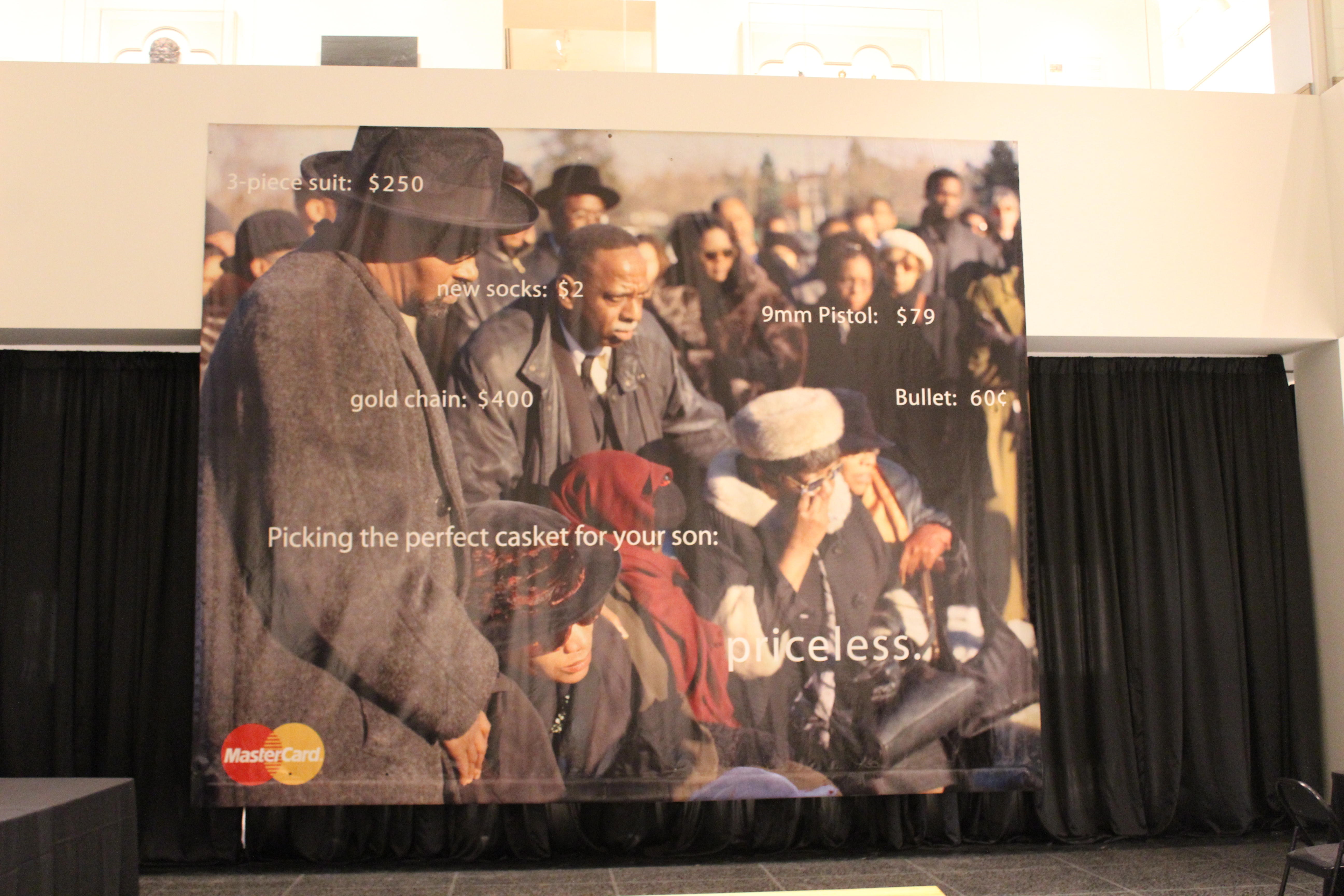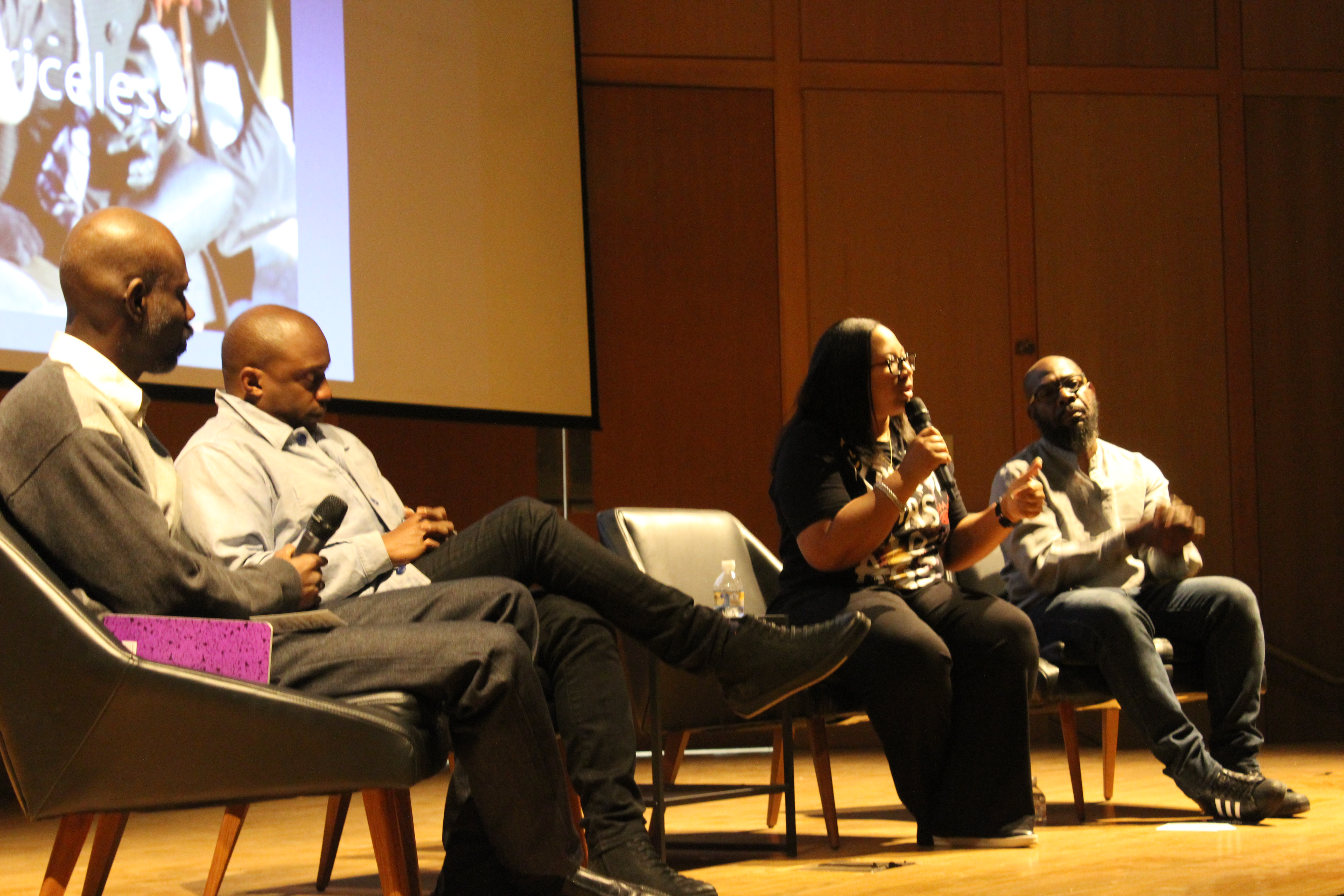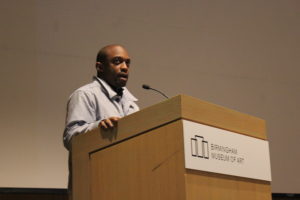
By Ariel Worthy
The Birmingham Times

Many have found artist Hank Willis Thomas’ work uncomfortable, especially “Priceless” which is a photograph he took at his cousin’s funeral, showing his grieving family as they buried the 27-year-old.
Among those who were uneasy? The artist himself.
“I also don’t like looking at the image,” said Thomas, Tuesday at the Birmingham Museum of Art. “That’s exactly why it exists. I came up with the text first and tried to use it with different photographs. My friend said, ‘why don’t you use this image (of your family)?’ and I cringed. I said I guess that’s the picture that goes with it. It was the moment I stopped becoming a photographer because I realized there was no picture I could take that could capture entirely the range of emotions that everyone was feeling.”
Thomas was Birmingham as part of Chapter 05, a conversation series part of the Third Space contemporary art exhibition at the BMA.
In 2007 the Art Museum hung the work outside its building, causing many people to be offended. After the funeral Thomas didn’t do anything with the photo for four years before he turned it into a banner the size of a billboard.
On Tuesday, Thomas’s controversial “Priceless” photo with the MasterCard logo was part of a panel discussion that included local activists and artists T Marie King, John Paul Taylor and Patrick Johnson. Panelists were also taken aback by the photo.
“The first thing I noticed was the Mastercard logo,” Johnson said. “The first thing I’m thinking is that this is a real Mastercard logo, and what are they doing?”
After, looking more closely, however, his opinion changed.
“We’ve seen this image before,” he said. “We’ve seen families lose a loved one. We’ve seen families gathered around comforting each other.”

King said she felt like she knew the family.
“In 2016 I used to work with youth over in Woodlawn,” she said. “And in 2016 I had to help a family prepare to bury their son that I had mentored. That following January I was doing it all over again with another child. So, I knew that story.”
Taylor said he also noticed the logo first and thought “that’s real.” The second thing he noticed were the people in the photo.
“When I went past ‘picking the perfect casket for your son’ and I saw the woman leaning, I was like, ‘aw man,’” Taylor said. “So often we’ll talk about the gun violence but we never talk about this part. The trauma.”
Thomas said the work was originally about black on black violence, but is relevant today with police violence against the African American community.
“Even with violence in general,” he said. “Like the Waffle House shooting. If everyone could look at this and be like ‘I don’t like this,’ not just because it’s a black family. This is unacceptable in our society.”
On April 22, a mass shooting occurred at a Nashville, TN Waffle House restaurant. Four were killed and two were injured from gunshots. Two others were cut by broken glass. The suspect was captured on April 23.
Societal Change

When pieces of art like “Priceless” are displayed, it turns a key of discomfort in people, King said.
“When you think about the Civil Rights Movement, people had to get uncomfortable for change to start to happen,” she said. “I think sometimes as uncomfortable certain things are we have to push it.”
King said she feels that though the South, Birmingham specifically, has (PTSD) “Post Traumatic Stress Disorder” from the Civil Rights Movement, we should work towards moving past it.
“The South has become a gatekeeper of our own pain,” King said. “We know the trauma, but no one wants to have that conversation and work through that pain. That’s why we have PTSD because we’re constantly reliving our history, our story.
“Nothing is wrong with saying, that happened, have we learned from it? but we continue to open that wound and we haven’t done the work that we need to do to start moving towards healing.”
Artists are important in societal change because they present issues to people who might not otherwise understand, she added.
“If someone sees this and says, ‘this offends me,’ well they need to be part of this conversation,” she said. “Let’s talk about why this offends you.”
Taylor said seeing diverse people at the talk was important and shifted the conversation to how to be an ally.
“I think if you think about the Starbucks situation in Philadelphia, I really appreciate the white gentleman who was with the black men was like, ‘what’s going on? What are you doing?’” she said. “He brought attention to it. Too often people sit there and don’t say anything and don’t bring attention to it until it’s too late.”
Oftentimes people need to just listen, she added.
“We start defending the oppressor and that’s where we mess up in our allyship,” she said. “Sometimes you may be uncomfortable in just listening.”




